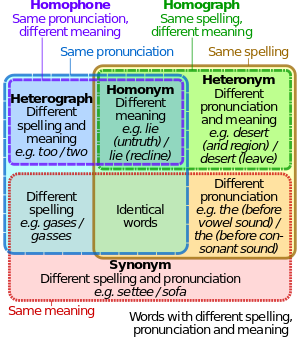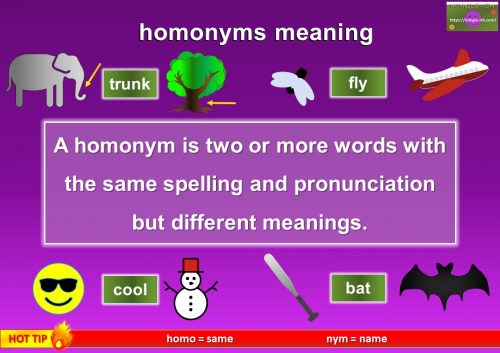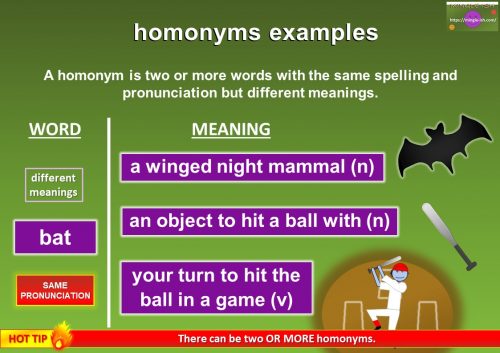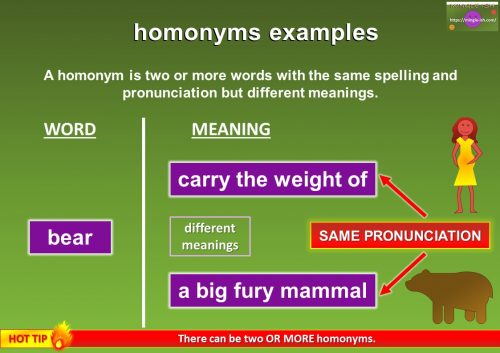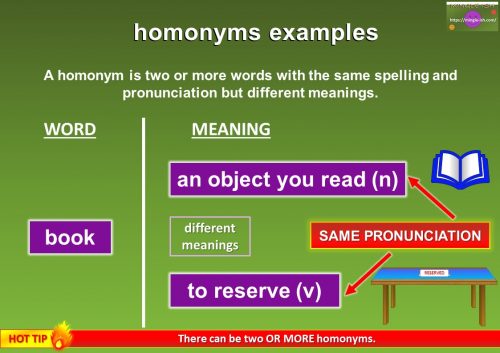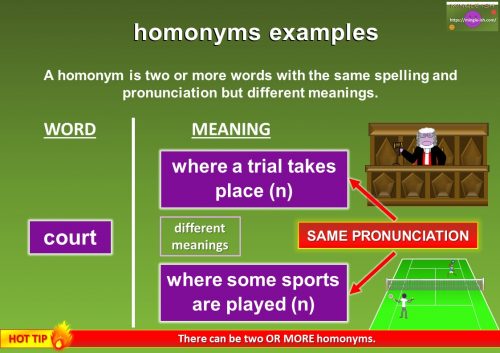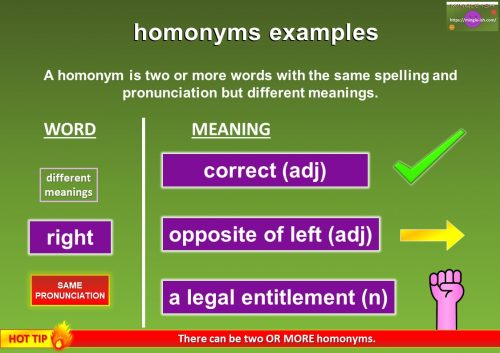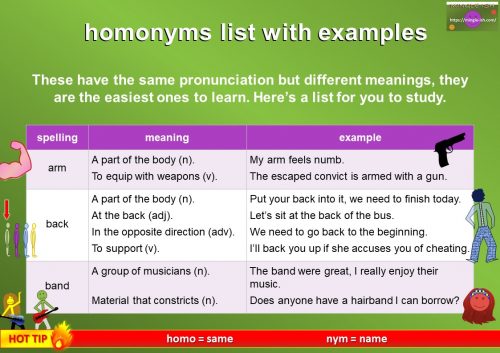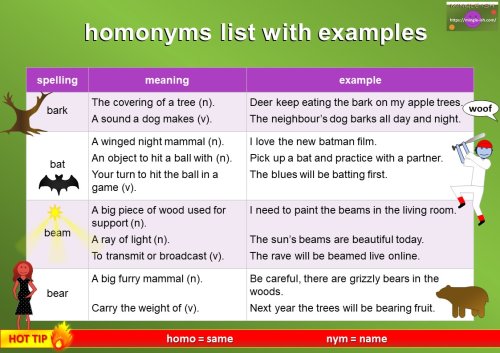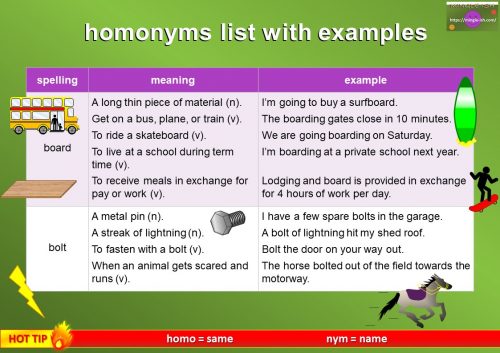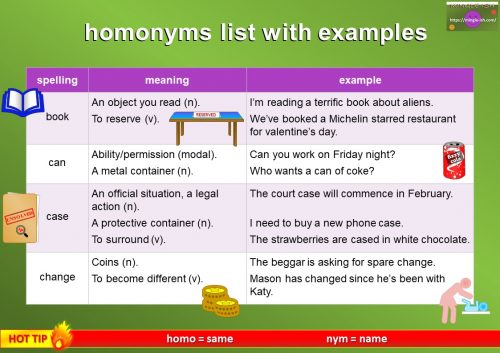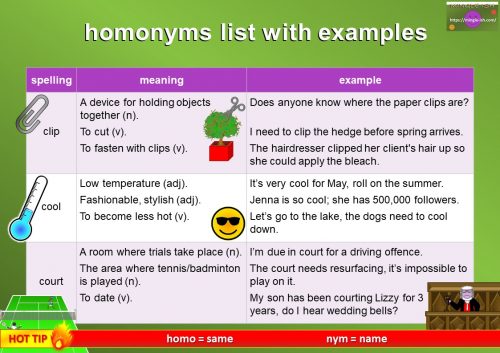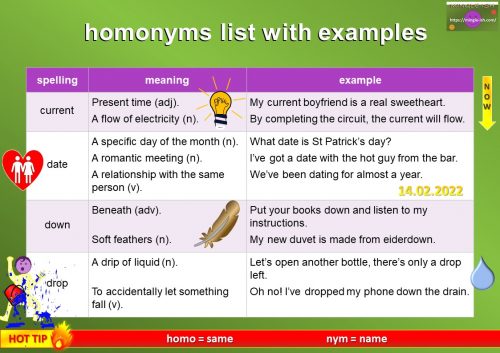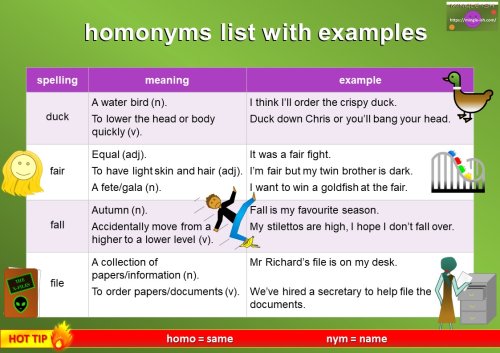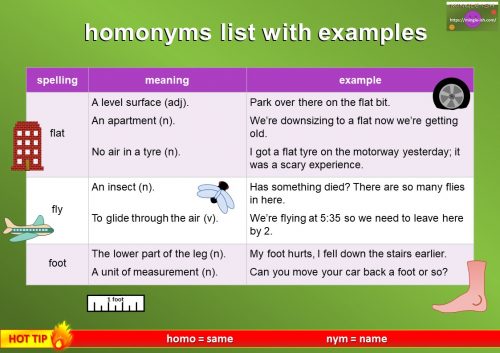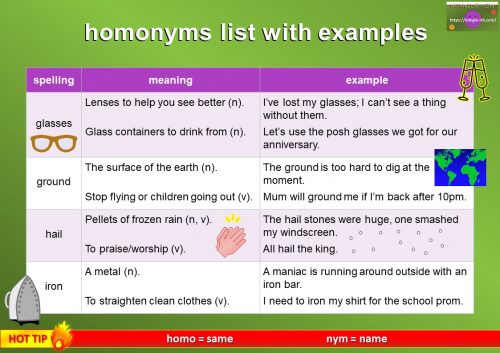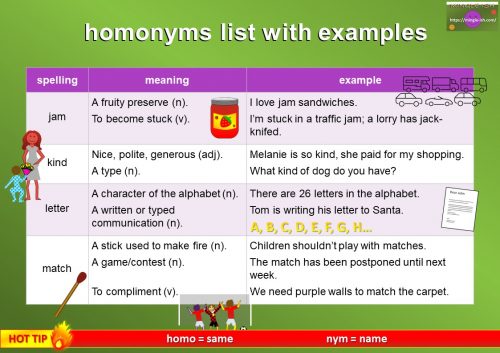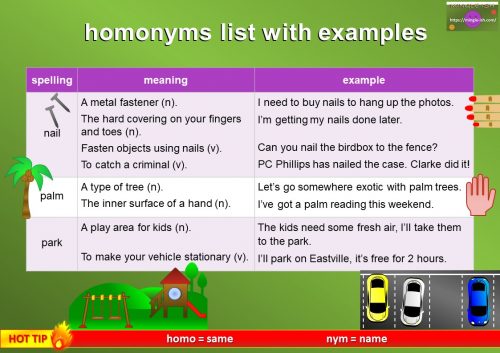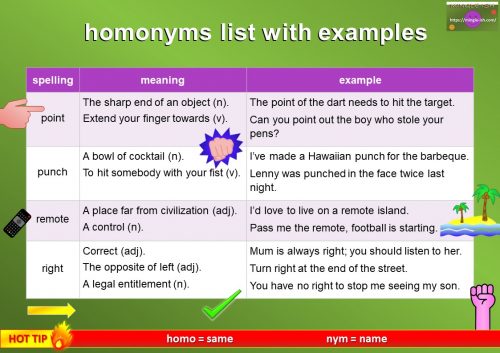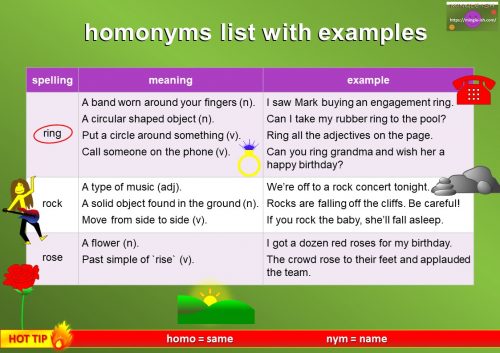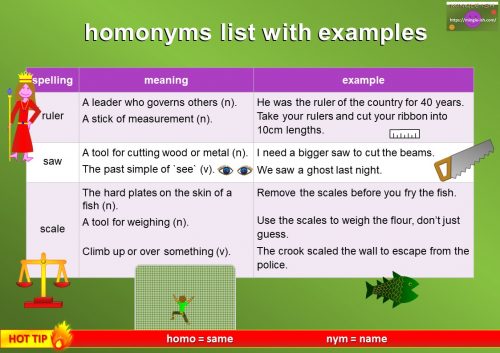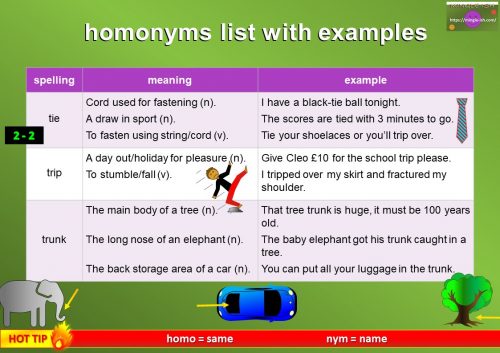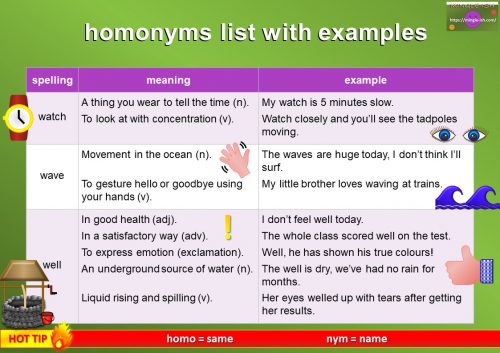The term «homonyms» in its broad meaning includes homonyms, homophones, and homographs. In more specific sense, homonyms are words with the same pronunciation and spelling but different in meaning. Homophones have the same pronunciation but are different in meaning and spelling. Homographs are identical in spelling but differ in meaning and pronunciation. Homophones present the most difficulty for learners of English.
The list below is mostly for intermediate and advanced learners. It includes common homonyms and less frequently used homonyms, with examples illustrating their use. A shorter list of homonyms for beginners is provided in Homonyms Short List in the section Writing.
Note: In many cases, homonyms are words of different origin (i.e., derived from different words). Depending on the definition this or that dictionary provides for the word «homonym» (and definitions of «homonym» may differ), some words in the list below, for example, «chord, cord; discreet, discrete; plain, plane; toast, toast; train, train; trunk, trunk», may or may not be considered homonyms as they were derived from one and the same word. For example, «plain» and «plane» were derived from Latin «planus» meaning «flat, level»; «trunk» was derived from Latin «truncus» meaning «truncated, lopped».
Термин «homonyms» в широком смысле включает в себя омонимы, омофоны и омографы. В более определённом смысле, омонимы – это слова с одинаковым произношением и написанием, но разные по значению. Омофоны имеют одинаковое произношение, но различаются в значении и написании. Омографы пишутся одинаково, но имеют разное значение и произношение. Омофоны представляют наибольшую трудность для изучающих английский язык.
Список ниже в основном для изучающих среднего и продвинутого уровня. Он включает в себя распространённые омонимы и менее употребительные омонимы, с примерами, иллюстрирующими их употребление. Более краткий список омонимов для начинающих дан в материале «Homonyms Short List» в разделе Writing.
Примечание: Во многих случаях, омонимы – это слова разного происхождения (т.е. образованные от разных слов). В зависимости от определения, которое тот или иной словарь даёт для слова «homonym» (а определения слова «homonym» могут отличаться), некоторые слова в списке ниже, например, «chord, cord; discreet, discrete; plain, plane; toast, toast; train, train; trunk, trunk», могут или не могут считаться омонимами, т.к. они были образованы от одного и того же слова. Например, «plain» и «plane» были образованы от латинского «planus» (плоский, ровный); «trunk» был образован от латинского «truncus» (усечённый, отрубленный).
The same pronunciation, different meaning
(Одинаковое произношение, разное значение)
AIR – HEIR (воздух, проветрить – наследник): fresh air; to air the room; the heir to the throne;
AISLE – ISLE (проход – остров): an aisle seat; to sit on the aisle; the British Isles;
ALTAR – ALTER (алтарь – изменить): to lead to the altar; to alter course; to alter a coat;
AURAL – ORAL (слуховой – устный, ротовой): aural perception; aural surgeon; oral examination; oral cavity;
BAIL – BALE (залог, освобождать под залог – кипа, тюк, связка): he was out on bail; he was bailed out for 1000 dollars; a bale of cotton; a bale of hay;
BALL – BALL (шар, мяч – бал): a ball of fire; to play ball; a ball gown; to open a ball;
BAND – BAND (отряд, группа – тесьма, завязка): a rock band; a rubber band;
BANK – BANK (насыпь, берег – банк): the bank of the river; the Bank of England; a bank account;
BARE – BEAR – BEAR (голый – нести ношу, родить – медведь): with bare hands; I can’t bear it; bear in mind; the polar bear;
BARK – BARK – BARK, BARQUE (лай, лаять – кора – парусное судно): the dog barked at me; the bark of a tree; a bark is a sailing ship;
BASE – BASE (основа, основание, база, базовый, основывать на – низкий, подлый): the base of a mountain; the story is based on real facts; base ingratitude; base conduct;
BAT – BAT – BAT (летучая мышь – бита – моргнуть): blind as a bat; a baseball bat; not to bat an eyelid;
BAY – BAY – BAY – BAY – BAY (бухта, залив – ниша, отсек – положение загнанного зверя – лавр – гнедой): Hudson Bay; bay window; an animal at bay; bay leaf; several bay horses;
BE – BEE (быть – пчела): to be or not to be; to be as busy as a bee; a bee in one’s bonnet;
BEAT – BEET (бить – свекла): to beat the drums; beets and carrots;
BERRY – BURY (ягода – хоронить): strawberry jam; to bury the dead; to bury the hatchet;
BERTH – BIRTH (койка – рождение): a single-berth compartment; birth certificate; to give birth to; she is French by birth;
BILL – BILL (счёт, банкнот – клюв): to pay the bill; a ten-dollar bill; a bill is the beak of a bird;
BIT – BIT – BIT (кусочек, немного – удила (часть уздечки), режущий край инструмента, бур, сверло – бит): a bit of butter; wait a bit; this drill has removable bits; the computer term «bit» is a contraction of «binary digit»;
BITE – BYTE (кусать, укус – байт): to bite one’s tongue; his dog bites; a deep bite; insect bites; one kilobyte is 1024 bytes;
BLOCK – BLOC (колода, квартал, преграда, блокировать – блок, объединение): a wooden block; walk two blocks; they blocked the exit; a military bloc;
BORE – BORE – BOAR (бурить – наскучить – кабан): to bore a hole; I’m bored; a wild boar;
BOUGH [bau] – BOW [bau] – BOW [bau] (сук, ветка – поклон, наклонить – корма судна): the boughs of a tree; to take a bow; to bow one’s head; the ship’s bow;
BOW [bou] – BEAU [bou] (лук для стрельбы, дуга, смычок, галстук-бабочка – кавалер): a bow and arrows; a rainbow; the bow of a violin; a bow tie; he is her new beau;
BRAKE – BREAK (тормоз, тормозить – перерыв, сломать, разбить): car brakes; let’s take a break; don’t break it;
BUY – BY – BYE (покупать – около, у – Пока!): to buy a car; to sit by the window; Bye-bye!
CACHE – CASH (тайник, запас – наличные деньги): cache memory; to pay cash; I have no cash;
CAN – CAN (мод. гл.: мочь, быть в состоянии – консервная банка, консервировать): I can do it; a can of beer; canned olives;
CANNON – CANON (пушка – правило, закон): water cannon; cannon ball; the canons of taste;
CANVAS – CANVASS (холст, брезент – предвыборная агитация): a painter’s canvas; to canvass a district;
CAPE – CAPE (накидка, плащ – мыс): he was wearing a dark gray cape; the Cape of Good Hope;
CARAT – CARROT (карат – морковь): a two-carat diamond; grated carrots;
CASE – CASE (случай, обстоятельство, положение дел, судебное дело, пример, довод – ящик, коробка, контейнер, футляр, чехол): in case of fire; a criminal case; two cases of wine; a jewel case;
CAST – CASTE (бросать, бросок – каста): to cast a glance; the cast of actors; high caste;
CELL – SELL (отсек, камера, ячейка, клетка – продавать): a prison cell; my cell phone; red blood cells; to buy and sell; to sell books;
CENSOR – SENSOR (цензор – датчик, чувств. элемент): to censor a document; acoustic sensor;
CENT – SCENT (цент – запах): 100 cents in a dollar; a faint scent of roses;
CEREAL – SERIAL (крупа – серийное издание): to eat breakfast cereal; to watch TV serials;
CHASE – CHASE (преследовать, погоня – паз, оправа, гравировать): to chase butterflies; to chase a thief; a wild-goose chase; metal chasing;
CHORD – CHORD – CORD (струна, хорда – аккорд – верёвка, шнур): to strike a deep chord; dissonant chords; electric cord; vocal cords;
CHUTE – SHOOT (скат, жёлоб – стрелять, делать съёмки): down the chute; to shoot a gun; to shoot a film;
CLIP – CLIP (подрезать – зажим, скрепка): to clip the hedge; a paper clip;
COARSE – COURSE (грубый – курс): coarse fabric; a course of lectures;
COLON – COLON (двоеточие – ободочная кишка): put a colon before a long list; colon cancer;
COLONEL – KERNEL (полковник – ядро, суть): lieutenant colonel; almond kernels; the kernel of the question;
COMPLEMENT – COMPLIMENT (комплемент, дополнение – комплимент): verb complement; give a compliment;
COUNCIL – COUNSEL (совет, собрание – совет, адвокат, дать совет): city council; legal counsel;
CREAK – CREEK (скрип, скрипеть – ручей): the floor creaks; a narrow creek;
CUE – CUE – QUEUE (намёк, подсказка – кий – очередь): give a cue; billiard cue; stand in a queue;
CURRANT – CURRENT (смородина – текущий, течение): red currant; current month; ocean current;
DAM – DAMN (плотина – проклятие): to build a dam; damn it; I don’t give a damn;
DEAR – DEER (дорогой – олень): Dear Sir; dear friend; a young deer; several deer;
DESERT [di’zərt] – DESSERT [di’zərt] (покидать – десерт): to desert the village; apple pie for dessert;
DEW – DUE (роса – должный): morning dew; When is the train due? with due respect;
DIE – DYE (умереть – краситель, окрашивать): He died two years ago. She dyed her hair red.
DISCREET – DISCRETE (осмотрительный – разрозненный): discreet silence; discrete parts;
DOE – DOUGH (самка оленя – тесто): a young doe; to roll the dough;
DUAL – DUEL (двойной – дуэль): dual citizenship; dual ownership; to fight a duel; verbal duel;
EARN – URN (зарабатывать – урна): to earn money; to earn a living; to earn respect; cremation urn;
EVE – EAVE, EAVES (канун – карниз, свес крыши): Christmas Eve; on the eve of their wedding; under the eaves;
FAIR – FAIR – FARE (справедливый – ярмарка – плата за проезд): that’s fair; book fair; bus fare;
FAST – FAST (быстрый, прочный – пост, поститься, ничего не есть): he drives too fast; hard-and-fast rules; to observe the fast;
FAUN – FAWN – FAWN (фавн – оленёнок (до одного года), жёлто-коричневый – подлизываться): in mythology, a faun is half man and half goat; fawn color is light yellowish brown; he is fawning on them;
FINE – FINE (прекрасный – штраф): one fine day; fine wine; to pay a fine for speeding;
FIR – FUR (ель – мех): pines and fir trees; a fir cone; a fur coat; natural fur;
FIT – FIT (годиться, подходить по размеру, подходящий – припадок, приступ): this dress fits you perfectly; it is a perfect fit; the food was fit for a king; a fit of coughing; a fit of anger;
FLAIR – FLARE (способность, чутьё – вспыхивать, вспышка): a flair for fashionable clothes; to flare up; a flare of anger;
FLEA – FLEE (блоха – спасаться бегством): a flea market; to flee the country;
FLAT – FLAT (плоский, плоская поверхность – квартира): flat roof; the flat of the hand; a block of flats;
FLOUR – FLOWER (мука – цветок): two cups of flour; a bunch of flowers;
FOREWORD – FORWARD (предисловие – вперёд): a foreword in a book; to move forward;
FORT – FORTE (форт – сильная сторона): a military fort; good spelling is her forte;
FOUL – FOWL (отвратительный, грязный – птица, дичь): foul smell; foul words; domestic fowl;
GAIT – GATE (походка – ворота): heavy gait; slow gait; to open the gate;
GILD – GUILD, GILD (золотить – гильдия): to gild the pill; gilded youth; the guild of merchants;
GILT – GUILT (позолота, позолоченный – вина): to cover with gilt; we have no proof of his guilt;
GRATE – GRATE – GREAT (решётка – скрести, тереть – большой, великий, замечательный): metal grate; to grate cheese; a great opportunity;
GRAVE – GRAVE (могила – серьёзный, тяжёлый, важный, мрачный): to dig a grave; grave situation; grave illness; his face was grave;
GROUND – GROUND (земля – молотый): to fall to the ground; freshly ground coffee;
HAIR – HARE (волосы – заяц): she has dark hair and green eyes; he ran like a hare;
HALL – HAUL (коридор, зал – тянуть, тащить): down the hall; a concert hall; to haul the boat;
HANGAR – HANGER (ангар – вешалка): a plane hangar; a coat hanger;
HAY – HEY (сено – эй): to make hay; hay fever; Hey!
HEAL – HEEL (излечивать – пятка, каблук): to heal the wounds; high heels;
HEAR – HERE (слышать – здесь): Did you hear what he said? She doesn’t live here.
HI – HIGH (привет – высокий): Hi, how are you? high walls; high speed; high temperature;
HOARSE – HORSE (хриплый – лошадь): a hoarse voice; to ride a horse;
HOLE – WHOLE (дыра – целый): a small hole in my sock; as a whole; the whole world;
I – EYE (я – глаз): I can see it clearly. My left eye itches.
IDLE – IDOL (неработающий, праздный – идол): idle machinery; idle talk; a teenage idol;
ILLICIT – ELICIT (незаконный – извлечь): illicit access; illicit trade; to elicit the truth; to elicit a reply;
JAM – JAM – JAMB (затор, сдавливать – джем – косяк, стойка): a traffic jam; to jam one’s finger in the door; strawberry jam; a door jamb;
KIND – KIND (сорт, вид – добрый): several kinds of apples; What kind of job are you looking for? it is very kind of you;
KNAP – NAP (дробить – лёгкий сон, дремать): to knap a stone; to take a nap;
KNEAD – NEED (месить, массировать – нужда, нуждаться в): to knead the dough; there is no need to worry; he needs rest;
KNIGHT – NIGHT (рыцарь – ночь): the Knights of the Round Table; a dark night; days and nights;
KNIT – NIT (вязать – гнида, яйцо блохи): to knit a sweater; a knitted cap; nit-picking;
KNOT – NOT (узел – не, нет): a tight knot; not a word; he is not a doctor;
KNOW – NO (знать – не, нет): Do you know him? No, I don’t. I have no time.
LAP – LAP – LAP (место от талии до колен в сидячем положении – один круг, оборот, один этап дистанции – лакать, лакание, плеск): the baby sat in his mother’s lap; a computer on his lap; he does six laps a day in the swimming pool; the dog lapped up the water; the sound of the waves lapping at the shore;
LEAK – LEEK (утечка, давать течь, протекать – лук-порей): a leak in the ship; the roof leaks; wild leek;
LESSEN – LESSON (уменьшить – урок): to lessen pain; to give a lesson; to learn a lesson;
LICHEN – LIKEN (лишайник – уподоблять): lichens are plants; he likens her to a rose;
LIE – LIE – LYE (ложь, лгать – лежать – щёлок): to tell a lie; don’t lie to me; to lie on the floor; a lye solution;
LIGHT – LIGHT – LIGHT (свет, светлый – лёгкий – натолкнуться, опускаться на): bright light; light blue; as light as a feather; light rain; a bird lighted on a branch;
LIME – LIME – LIME (известь – лайм – липа): burnt lime; lime juice; lime tree;
LOAN – LONE (ссуда, дать взаймы – одинокий): a bank loan; she loaned him some money; a lone house; a lone traveler; a lone wolf;
LOOP – LOUPE (петля – лупа): to make a loop; a loophole; a loupe is a magnifying glass;
MAIL – MAIL – MALE (почта, отправить почтой – кольчуга, броня – мужского пола, мужчина): Is there any mail for me? to send by mail; a coat of mail; a male child; a male dog;
MAIN – MANE (главный – грива): the main reason; a horse’s mane;
MAIZE – MAZE (маис, кукуруза – лабиринт): maize oil; a maze of streets; a maze is a labyrinth;
MALL – MAUL (пешеходная аллея – кувалда, калечить): shopping mall; to be badly mauled;
MANTEL – MANTLE (каминная полка – накидка, мантия): mantelpiece; mantelshelf; a silk mantle; the mantle of darkness;
MARSHAL – MARTIAL (маршал, выстроить – военный): air marshal; to marshal facts; martial law;
MATCH – MATCH (спичка – ровня, пара, подходить под пару, состязание, матч): to strike a match; a perfect match of colors; these two things don’t match; a football match;
MEAN – MEAN – MEAN (значить – плохой, скудный, низкий, подлый – средний, средняя величина): What do you mean? a mean trick; it was mean of him; mean time; mean speed;
MEAT – MEET (мясо – встретить): meat and potatoes; to meet a girl; to meet with friends;
MEDAL – MEDDLE (медаль – вмешиваться): a gold medal; to meddle in someone’s affairs;
METAL – METTLE (металл – характер): a metal door; to show one’s mettle; full of mettle;
MIGHT – MIGHT – MITE – MITE (мощь – мод. гл.: быть возможным – клещ – чуточка, капелька): with all his might; it might be true; the itch mite; a mite of consolation;
MISS – MISS (промахнуться, промах, пропускать, скучать по – мисс): he fired twice and missed; a near miss; she missed her bus; he misses his family; Miss Smith; Miss, can you help me?
MOLE – MOLE (родинка – крот): a black mole on the chin; as blind as a mole;
MOOR – MOOR (заболоченная местность – пришвартовать): moorlands have bad soil; to moor a ship;
MOOSE – MOUSSE (лось – мусс): to hunt moose; chocolate mousse;
MORNING – MOURNING (утро – скорбь, траур): on Monday morning; from morning till night; to be in deep mourning;
MUSCLE – MUSSEL (мускул – мидия): strong muscles; a man of muscle; mussels are mollusks;
NAVAL – NAVEL (военно-морской – пупок): naval academy; naval officer; navel infection;
NONE – NUN (ни один – монахиня): none of them; I have none; nuns and monks; she is a nun;
OAR – OR – ORE (весло – или – руда): a four-oar boat; one or two; iron ore;
PAIL – PALE (ведро – бледный): a pail of water; his face is pale; pale gray;
PAIN – PANE (боль – оконное стекло): dull pain; a pain in the chest; to take pains; window pane;
PAIR – PARE – PEAR (пара – очищать от кожуры – груша): a pair of gloves; to pare an apple; apples and pears;
PAT – PAT (шлепок, хлопок, похлопать, погладить – подходящий, уместный): a pat on the back; to pat a dog; a pat answer;
PEA – slang: PEE (горох – моча, мочиться): green peas; pea soup; to take a pee;
PEACE – PIECE (мир, покой – кусок): peace and quiet; a piece of bread; a piece of paper;
PEAK – PEEK – PIQUE (пик – заглянуть, взглянуть – уязвить, возбудить): a mountain peak; to peek into the hole; his curiosity was piqued;
PEAL – PEEL (звон колоколов, звонить в колокола – кожица, корка, чистить фрукты, овощи): to peal the bells; apple peel; to peel potatoes;
PEDAL – PEDDLE (педаль – торговать вразнос, мелочами): the gas pedal; to peddle goods from door to door;
PEER – PEER – PIER (сверстник, ровня – вглядываться – причал, пирс): peer group; to be judged by one’s peers; she peered into the dark room; the boat is at the pier;
PINE – PINE (сосна – чахнуть, тосковать): pines grow in many regions of the world; a pine forest; to pine with grief; she is pining for home;
PIT – PIT (яма – косточка фрукта, вынимать косточки): to dig a pit; air pit; orchestra pit; the pit of the stomach; a cherry pit (BrE: a cherry stone); to pit cherries (peaches, plums); to remove the pits;
PITCH – PITCH (бросок, высота/уровень/степень, бросать, сооружать – смола): a high-pitched voice; a high pitch of anxiety; to pitch a baseball; to pitch a tent; as black as pitch;
PLACE – PLAICE (место – камбала европейская): it is a good place for a picnic; plaice is European flatfish;
PLAIN – PLANE (ясный, очевидный, простой, равнина – плоскость, плоский): plain answer; plain food; the Great Plains; horizontal plane; plane geometry;
PLANE – PLANE – PLANE (самолёт – рубанок – платан): to go by plane; an airplane; a plane is a tool for smoothing wooden surfaces; a plane tree, or plane, is a large tree with broad leaves;
PLUM – PLUMB (слива – отвес): plums and peaches; to pick the plums; plumb line; plumb bob;
POLE – POLE – POLL (столб, шест – полюс – список избирателей, подсчет голосов, опрос): a telegraph pole; the North Pole; public opinion poll; exit poll;
PORE – PORE – POUR (обдумывать, изучать – пора (в коже) – лить): to pore over a problem; pores in the skin; to pour water into a glass;
POUND – POUND (фунт – колотить): a pound of cheese; to change dollars for pounds; to pound on the door;
PRAY – PREY (молиться – жертва, добыча): to pray to God; easy prey; birds of prey;
PRINCIPAL – PRINCIPLE (главный, начальник – принцип): principal cause; the school principal; a man of principle; on principle;
PROFIT – PROPHET (выгода, прибыль – пророк): profit and loss; he sold his house at a profit; the word «prophet» meant «speaker» in Greek;
PRUNE – PRUNE (чернослив – обрезать ветви, убирать лишнее): prunes are dried plums; to prune trees; to prune costs;
PRY – PRY (любопытствовать, совать нос – с силой / с трудом сдвинуть, открыть, вырвать): to pry into other people’s affairs; to pry the door open;
RACE – RACE (раса – скачки, гонка): the human race; horse racing; a race horse; race cars;
RACK – RACK – WRACK (вешалка, подставка, полка – пытка, пытать, мучить – разрушение, гибель): dish rack; luggage rack; to rack one’s brains; to go to wrack and ruin (also: to go to rack and ruin);
RAIN – REIGN – REIN (дождь – царствование – вожжа): it looks like rain; during his reign; a pair of reins;
RAP – WRAP (лёгкий удар, слегка/быстро ударять, стучать – шаль, шарф, обёртывать, завернуть): he rapped at the door; she wrapped the package in brown paper;
READ – REED (читать – тростник): to read a book; reed grows near water;
REEK – WREAK (вонь, вонять – излить на): to reek of alcohol; to wreak havoc on the enemy;
REST – REST – WREST (отдых, отдыхать – остаток, остальное – вырвать силой): rest a little; leave the rest of them here; to wrest a knife from someone’s hands;
RETCH – WRETCH (вызывать рвоту – жалкий человек, негодяй): it made her retch; a poor wretch;
REVIEW – REVUE (обзор, рецензия, рассматривать – ревю): to write a review; theatrical revue;
RIGHT – RITE – WRITE (правильный, правый, право – обряд – писать): that’s right; my right hand; civil rights; funeral rites; write a letter;
RING – RING – WRING (кольцо – звонить – скручивать): a wedding ring; to ring a bell; to wring one’s hands;
ROCK – ROCK (скала, камень – качать, качаться, качание): as firm as a rock; to rock the cradle; to rock the boat;
ROLE – ROLL (роль – рулон, катить): to play a role; a roll of toilet paper; the ball rolled away;
ROOT – ROUTE (корень – маршрут): the roots of the tree; Route 10; bus route;
ROW [rou] – ROW [rou] – ROE [rou] – ROE [rou] (ряд – грести – косуля – икра рыб): to sit in the first row; to stand in a row; to row the boat; a roe deer is also called a roe; the roe of sturgeon is called caviar;
RYE – WRY (рожь – кривой): rye bread; rye whiskey; a wry smile; a wry look;
SAIL – SALE (парус, плыть – распродажа): to sail on a ship; I bought it on sale;
SAW – SAW (пила, пилить – старинная пословица, изречение): to saw a log; an old saw;
SEA – SEE (море – видеть): the Black Sea; I want to see the sea. Have you ever seen the sea at sunrise? Did you see it?
SEAL – SEAL (печать, ставить печать, запечатывать – тюлень): the seal of fate; to seal an envelope; seals are sea mammals;
SEAM – SEEM (шов – казаться): Please take it in at the seams. She seems to be a little nervous.
SERF – SURF (крепостной, раб – прибой, плыть на гребне волны, заниматься серфингом): liberation of the serfs; the sound of the surf; to ride a surfboard; surfing;
SEW – SO – SOW (шить – так – сеять): to sew a dress; be so kind; to sow the seeds;
SHEAR – SHEER – SHEER (срезать, ножницы – прозрачный, абсолютный – отклониться от курса): to shear sheep; a pair of shears; sheer stockings; sheer nonsense; the ship was able to sheer off to avoid the collision;
SIGHT – SITE – CITE (вид, зрение – место – цитировать): a beautiful sight; to see the sights; good eyesight; construction site; website; to cite from a book;
SLAY – SLEIGH (сразить, умертвить – сани): slain by a bullet; a horse-drawn sleigh; sleigh bells;
SLEIGHT – SLIGHT – SLIGHT (ловкость – небольшой – пренебрежение, пренебрегать): a sleight of hand; a slight fever; to slight one’s duties;
SOAR – SORE (парить, взмывать – болячка, воспалённый): prices soared; a cold sore; a sore throat;
SOLE – SOLE – SOLE – SOUL (единственный – подошва – камбала – душа): sole heir; shoe sole; fillet of sole; body and soul;
SOME – SUM (какой-то, некоторый – сумма): I need some money; a large sum of money;
SON – SUN (сын – солнце): he is my son; she has three sons; the sun is shining;
SOUND – SOUND – SOUND – SOUND (звук – здоровый – зонд, щуп, измерять глубину, зондировать – узкий пролив): the sounds of music; a sound mind in a sound body; to sound the depth; the Long Island Sound;
STABLE – STABLE (конюшня – стабильный, прочный): a stable full of horses; a stable position;
STAIR – STARE (ступенька – пристально смотреть): go down the stairs; don’t stare at people;
STAKE – STAKE – STEAK (кол, столб – ставка – бифштекс): to pull up stakes; the stakes are high; I’d like a steak for dinner;
STALK – STALK (стебель – выслеживать, подкрадываться): corn stalk; to stalk a deer;
STATIONARY – STATIONERY (неподвижный – писчая бумага и др. канц. товары): stationary bicycle; letterhead stationery;
STEAL – STEEL (красть – сталь): to steal money; to steal a kiss; stainless steel; a heart of steel;
STEP – STEPPE (шаг, шагнуть – степь): the next step; to step forward; alpine steppe;
STICK – STICK (палка, палочка – воткнуть, проколоть, вставить, высунуть, приклеить): he struck him with a stick; to stick a needle into one’s finger; to stick a stamp on an envelope;
STRAIGHT – STRAIT (прямой – узкий пролив): a straight road; the Strait of Gibraltar;
SUITE – SWEET (комплект, номер-люкс, сюита – сладкий): a hotel suite; this cake is too sweet;
TAIL – TALE (хвост – рассказ): a bird with a long tail; a long and interesting tale;
TEA – TEE – TEE (чай – T-образный – метка для мяча в гольфе): a cup of tea; a tea party; a tee joint; to a tee; to tee off;
TEAM – TEEM (команда, объединяться – изобиловать): a football team; to teem with fish;
TEAR – TIER (слеза – ярус): tears in her eyes; the second tier;
THYME – TIME (тимьян – время): thyme is used for seasoning; I need more time;
TIC – TICK – TICK – TICK (тик – тикать, тиканье, галочка – клещ – чехол для матраца): to suffer from tic; the ticking of the clock; to mark with a tick; tick fever; bedtick;
TIP – TIP – TIP – TIP (кончик – наклонить – чаевые – намёк, совет, предупредить): the tip of the tongue; to tip the scales; a one-dollar tip; to give a tip; useful tips on gardening; to tip off;
TOAST – TOAST (тост, гренок – тост за): a piece of toast; I’d like to propose a toast to Alan’s health;
TOE – TOW (палец ноги – буксир, буксировать): I stubbed my toe; a tow truck; to tow a car;
TOO – TWO (тоже – два): I like it too. I spent two days at the lake.
TRAIN – TRAIN (поезд – учить, тренировать): to go by train; to train nurses; to train for the championship;
TRUNK – TRUNK (ствол дерева, туловище, хобот слона – сундук, багажник): the trunk of a tree; an elephant’s trunk; a wooden trunk; the trunk of a car;
VAIN – VANE – VEIN (тщетный, тщеславный – флюгер, лопасть – вена): in vain; she is vain; a weather vane; the vanes of a turbine; veins carry blood to the heart;
VICE – VISE, VICE (порок – тиски): vice squad; organized vice; table vise; vise clamp;
WAIL – WHALE (вопль, вой, вопить, выть – кит): a wail of grief; to wail with pain; killer whales;
WAIST – WASTE (талия – излишняя трата): a slender waist; a waste of time; to waste money;
WAIT – WEIGHT (ждать – вес): to wait for an hour; her weight is 65 kilograms;
WAIVE – WAVE (отказаться от требования – волна, качаться, махать): to waive a claim; ocean waves; a wave of emotion; to wave a flag;
WARE – WEAR – WHERE (изделия – одежда, носить одежду – где): glassware; kitchenware; women’s wear; sportswear; she is wearing a suit; Where is Mike?
WAY – WEIGH – WHEY (путь – взвесить – молочная сыворотка): to find a way; the shortest way; to weigh potatoes; she weighs 65 kilograms; curd and whey;
WEAK – WEEK (слабый – неделя): weak eyes; weak will; next week; for two weeks;
WEATHER – WHETHER (погода – ли): nice weather; ask her whether she wants to go;
WELL – WELL (хорошо – колодец): very well; to feel well; a deep well;
WET – WHET (мокрый – обострить): wet hands; wet floor; to whet a knife; to whet the appetite;
WHICH – WITCH (который – ведьма, колдунья): which of these; Which bag is yours? She is a real witch.
WHINE – WINE (скулить – вино): my dog often whines; stop whining; red wine; French wines;
WILL – WILL (вспом. и мод. гл.: будет – воля, желание, завещание): he will see you tomorrow; he has the will to succeed;
YOKE – YOLK (ярмо, хомут, иго – желток): the yoke of slavery; the yolk of an egg.
The same spelling, different pronunciation, different meaning
(Одинаковое написание, разное произношение, разное значение)
BOW [bou] – BOW [bau] – BOW [bau] (лук для стрельбы, дуга, смычок, бант, галстук-бабочка – поклон, наклонить – корма судна): a bow and arrows; a rainbow; the bow of a violin; a bow tie; to take a bow; to bow one’s head; the ship’s bow;
DESERT [‘dezərt] – DESERT [di’zərt] (пустыня – покидать): the Sahara Desert; he deserted her;
FORTE [fo:rt] – FORTE [‘fo:rtei], [‘fo:rti] (сильная сторона – муз.: форте): good spelling is her forte; forte-piano;
LEAD [li:d] – LEAD [led] (вести – свинец): this road leads to the lake; as heavy as lead;
ROW [rou] – ROW [rau] (ряд – ссора): Please stand in a row. My neighbors had a row yesterday.
SOW [sou] – SOW [sau] (сеять – свинья): to sow the seeds; to raise sows;
TEAR [tiər] – TEAR [teər] (слеза – рвать): tears in her eyes; to tear up his letter;
WIND [wind] – WIND [waind] (ветер – извиваться, заводить): a cold wind; to wind the clock.
Note: Homonyms in the form of proper names are not included in the list because there may be hundreds of them. Examples: bet – Bette; bell – Belle; bill – Bill; may – May – Mae; cliff – Cliff; penny – Penny; capital – Capitol; grease – Greece; main – Maine. (Омонимы в виде имён собственных не включены в список, т.к. их могут быть сотни.)
Homonyms with certain word forms
Many other homonyms occur when verbs, nouns, or pronouns are used in certain forms showing person, number, or tense. Word order and meaning help us to distinguish between such homonyms aurally. Examples: He left the house to his son. The house on the left belongs to my aunt. The list below provides examples of word forms that have the same pronunciation as some other words.
Многие другие омонимы возникают, когда глаголы, существительные или местоимения употреблены в некоторых формах, показывающих лицо, число или время. Порядок слов и значение помогают нам различить такие омонимы на слух. Примеры: He left the house to his son. (Он оставил дом своему сыну.) The house on the left belongs to my aunt. (Дом слева принадлежит моей тёте.) Список ниже дает примеры словоформ, которые имеют одинаковое произношение с некоторыми другими словами.
Third person singular:
sees – seize – seas (видит – схватить – моря); knows – nose (знает – нос); brews – bruise (варит – синяк); adds – ads (добавляет – объявления); links – lynx (соединяет – рысь); means – means (значит – средство); pries – prize (суёт нос в чужие дела – приз); prays – praise (молится – похвала, хвалить);
Past Indefinite:
allowed – aloud (разрешил – вслух); banned – band (запретил – отряд, группа); bored – board (заскучавший – доска); fined – find (оштрафовал – найти); leased – least (арендовал – наименьший); missed – mist (пропустил – туман); passed – past (прошёл – прошлое); owed – ode (был должен – ода); mowed – mode (скосил – способ); towed – toad (буксировал – жаба); mustered – mustard (собрал – горчица); tied – tide (связал – прилив);
led – lead [led] (вёл – свинец); read [red] – red (прочитал – красный); rode – road (ехал – дорога); made – maid (сделал – девушка); saw (увидел) – saw (пила); sent – cent (послал – цент); blew – blue (подул – синий); flew – flu (летел – грипп); knew – new (знал – новый); threw – through (бросил – сквозь); ate – eight (ел – восемь); won – one (выиграл – один); heard – herd (слышал – стадо); left – left (ушёл – левый); wore – war (был одет в – война); would – wood;
Past Participle:
ground – ground (молотый – земля); grown – groan (выращенный – стон); mown – moan (скошенный – стон); thrown – throne (брошенный – трон); seen – scene (увиденный – сцена); lain – lane (пролежавший – узкая дорога);
Plural nouns:
rays – raise (лучи – поднять); days – daze (дни – оцепенение); rows – rose – rose (ряды – роза – поднялся); brows – browse (брови – просматривать); claws – clause (когти – статья, пункт); seas – seize (моря – схватить); feet – feat (ступни, ноги – достижение, подвиг, мастерство);
Pronouns:
him – hymn (его – гимн); mine – mine (мой – рудник, мина); our – hour (наш – час); their – there (их – там);
Contractions:
who’s – whose (кто есть – чей); it’s – its (это есть – её); there’s – theirs (там есть – их); I’ll – aisle (я буду – проход); he’ll – heel (он будет – пятка); we’ll – wheel (мы будем – колесо); we’d – weed (мы бы – сорняк); he’d – heed (он бы – внимание);
Words with suffixes:
fourth – forth (четвёртый – вперёд); higher – hire (выше – нанимать); miner – minor (шахтёр – небольшой); chilly – chili (холодный – перец чили); wholly – holy (целиком – святой);
Two-word combination – one word:
all ready – already (всё готово – уже); all together – altogether (все вместе – вполне, совсем); any way – anyway (любой путь – во всяком случае); he may be there – maybe he is there (он может быть там – возможно он там); mean time (среднее время) – meantime (тем временем).
Note: In British English, homonyms (homophones) may also occur in some of those cases where the sound [r] is not pronounced in words. For example: arms – alms; pour – paw; sore – saw; sort – sought; court – caught, etc. Such words are not homophones in American English where the sound [r] is pronounced in all cases. Note that «ant» and «aunt», pronounced [ænt], are homophones in American English.
Homonymous constructions
In English, not only words but whole constructions can be homonymous in their structure. Due to the limited number of different grammatical forms, the same form is used in different functions. For example, there are only two case forms for personal pronouns (I — me, he – him, we – us, etc.) and only one case form for nouns (i.e., in fact there are no case forms for nouns); the ending ING is used for gerund, present participle, and some adjectives; IT is used as a pronoun in the third person singular for inanimate objects and as a grammatical subject in impersonal sentences. As a result, homonymous constructions appear. Compare these examples:
В английском языке не только слова, но и целые конструкции могут быть омонимичными по своему построению. Из-за ограниченного числа разных грамматических форм, одна и та же форма используется в разных функциях. Например, есть только две формы падежей для личных местоимений (I — me, he – him, we – us и т.д.) и только одна форма падежей для существительных (т.е. фактически нет форм падежей существительных); окончание ING используется для герундия, причастия настоящего времени и некоторых прилагательных; IT используется как местоимение в 3 лице ед. числа для неодушевлённых предметов и как грамматическое подлежащее в безличных предложениях. Как результат, появляются омонимичные конструкции. Сравните эти примеры:
She called him a taxi. (Она вызвала ему такси.) – She called him an idiot. (Она назвала его идиотом.)
They made him a hero. (Они сделали его героем.) – They made him a sandwich. (Они сделали ему бутерброд.)
I see a moving ‘truck. (Я вижу движущийся грузовик.) – I see a ‘moving truck. (Я вижу грузовик для перевозки мебели.)
He is reading. (Он читает.) – He is interesting. (Он интересный.)
It’s water. (Это вода.) – It’s Monday. (Понедельник. – т.е. Сегодня понедельник.)
It’s cold. (Оно холодное. – о предмете) – It’s cold. (Холодно. – о погоде)
The word Homonymy (from the Greek—homos: same, onoma: name) is the relation between words with identical forms but different meanings—that is, the condition of being homonyms. A stock example is the word bank as it appears in «river bank» and «savings bank.»
Linguist Deborah Tannen has used the term pragmatic homonymy (or ambiguity) to describe the phenomenon by which two speakers «use the same linguistic devices to achieve different ends» (Conversational Style, 2005). As Tom McArthur has noted, «There is an extensive gray area between the concepts of polysemy and homonymy» (Concise Oxford Companion to the English Language, 2005).
Examples and Observations
«Homonyms are illustrated from the various meanings of the word bear (animal, carry) or ear (of body, of corn). In these examples, the identity covers both the spoken and written forms, but it is possible to have partial homonymy—or heteronymy—where the identity is within a single medium, as in homophony and homography. When there is ambiguity between homonyms (whether non-deliberate or contrived, as in riddles and puns), a homonymic clash or conflict is said to have occurred.»
(David Crystal. A Dictionary of Linguistics and Phonetics, 6th ed. Blackwell, 2008)
Peer and Peep
«Examples of homonymy are peer (‘person belonging to the same group in age and status’) and peer (‘look searchingly’), or peep (‘making a feeble shrill sound’) and peep (‘look cautiously’).»
(Sidney Greenbaum and Gerald Nelson, An Introduction to English Grammar, 3rd ed. Pearson, 2009)
Homonymy and Polysemy
«Homonymy and polysemy both involve one lexical form that is associated with multiple senses and as such both are possible sources of lexical ambiguity. But while homonyms are distinct lexemes that happen to share the same form, in polysemy a single lexeme is associated with multiple senses. The distinction between homonymy and polysemy is usually made on the basis of the relatedness of the senses: polysemy involves related senses, whereas the senses associated with homonymous lexemes are not related.» (M. Lynne Murphy and Anu Koskela, Key Terms in Semantics. Continuum 2010)
Two Words, Same Form
«Linguists have long distinguished between polysemy and homonymy (e.g., Lyons 1977: 22, 235). Usually, an account like the following is given. Homonymy obtains when two words accidentally have the same form, such as bank ‘land bordering on a river’ and bank ‘financial institution.’ Polysemy obtains where one word has several similar meanings, such as may indicating ‘permission’ (e.g., May I go now?) and may indicating possibility (e.g., It may never happen). Since it is not easy to say when two meanings are totally different or unrelated (as in homonymy) or when they are just a little different and related (as in polysemy), it has been customary to adduce additional, more easily decidable criteria.»
Dictionaries’ Distinction
«Dictionaries recognize the distinction between polysemy and homonymy by making a polysemous item a single dictionary entry and making homophonous lexemes two or more separate entries. Thus head is one entry and bank is entered twice. Producers of dictionaries often make a decision in this regard on the basis of etymology, which is not necessarily relevant, and in fact separate entries are necessary in some instances when two lexemes have a common origin. The form pupil, for instance, has two different senses, ‘part of the eye’ and ‘school child.’ Historically these have a common origin but at present they are semantically unrelated. Similarly, flower and flour were originally ‘the same word,’ and so were the verbs to poach (a way of cooking in water) and to poach ‘to hunt [animals] on another person’s land’), but the meanings are now far apart and all dictionaries treat them as homonyms, with separate listing. The distinction between homonymy and polysemy is not an easy one to make. Two lexemes are either identical in form or not, but relatedness of meaning is not a matter of yes or no; it is a matter of more or less.» (Charles W. Kreidler, Introducing English Semantics. Routledge, 1998)
No Clear Cut Homonymy
«The trouble is that, although helpful, these criteria are not totally compatible and do not go all the way. There are cases where we may think that the meanings are clearly distinct and that we therefore have homonymy, but which cannot be distinguished by the given linguistic formal criteria, e.g., charm may denote ‘a kind of interpersonal attraction’ and may also be used in physics denoting ‘a kind of physical energy.’ Not even the word bank, usually given in most textbooks as the archetypical example of homonymy, is clear-cut. Both the ‘financial bank’ and the ‘river bank’ meanings derive by a process of metonymy and metaphor, respectively from Old French banc ‘bench.’ Since bank in its two meanings belongs to the same part of speech and is not associated with two inflectional paradigms, the meanings of bank are not a case of homonymy by any of the above criteria…Traditional linguistic criteria for distinguishing homonymy from polysemy, although no doubt helpful, in the end turn out to be insufficient.»(Jens Allwood, «Meaning Potentials and Context: Some Consequences for the Analysis of Variation in Meaning.» Cognitive Approaches to Lexical Semantics, ed. by Hubert Cuyckens, René Dirven, and John R. Taylor. Walter de Gruyter, 2003)
Aristotle on Homonymy
«Those things are called homonymous of which the name alone is common, but the account of being corresponding to the name is different…Those things are called synonymous of which the name is common, and the account of being corresponding to the name is the same.»(Aristotle, Categories)
Astonishing Sweep
«The sweep of Aristotle’s application of homonymy is in some ways astonishing. He appeals to homonymy in virtually every area of his philosophy. Along with being and goodness, Aristotle also accepts (or at times accepts) the homonymy or multivocity of: life, oneness, cause, source or principle, nature, necessity, substance, the body, friendship, part, whole, priority, posteriority, genus, species, the state, justice, and many others. Indeed, he dedicates an entire book of the Metaphysics to a recording and partial sorting of the many ways core philosophical notions are said to be. His preoccupation with homonymy influences his approach to almost every subject of inquiry he considers, and it clearly structures the philosophical methodology that he employs both when criticizing others and when advancing his own positive theories.» (Christopher Shields, Order in Multiplicity: Homonymy in the Philosophy of Aristotle. Oxford University Press, 1999).
Ever chat to your friend about baking bread, and you’re both confused between needing some flour and kneading some flour because neither of you has provided further context? That’s an example of homonymy, words with different meanings but pronounced and/or spelt the same. The definition of homonymy is rather broad, as it covers both the pronunciation and the spelling. , which we will explain further with some examples and comparisons to other lexically ambiguous words!
Homonymy meaning
What is the meaning of homonymy? When two or more words are homonyms, these words are pronounced and/or spelt the same, but their meanings aren’t related to each other. Because of these multiple meanings, if a homonymous word is used with little context, it can cause lexical ambiguity (confusion caused by words that have more than one possible meaning).
Look at these examples of homonymy and find one word that they all have in common and think about its meaning in each sentence:
- Do you have a rubber band?
- My band is performing tonight.
- We band every bird to track their movements.


Each sentence above uses the word band. There is nothing that connects the three different meanings of band except for the spelling and pronunciation. Therefore, the word band is a homonym in each case.
Study tip: For words to be classified as homonyms, they need to meet two criteria:
Have different meanings, e.g. meaning 1 and meaning 2.
Be pronounced the same, spelt the same, or both.
Homonymy pronunciation
In case you were unsure as to how to pronounce the word ‘homonymy’, it is pronounced like this:
Huh-mon-uh-mee.
Homonymy examples
Some other examples of homonymy are:
Address:
- Your essay fails to address the main issue. = give attention to a problem (verb)
- What is your address? = a location (noun)
Park:
- You can’t park your car here. = to leave a vehicle somewhere for some time (verb).
- Are you heading to the park now? = a public place with fields and trees (noun).
Tender:
- After the accident, he needs some tender loving care. = gentle (adjective).
- Your firm submitted the lowest tender. = a formal offer to supply goods or do work at a stated price (noun).
Skirt:
- Every night she rocks her baby to sleep. = to move backwards and forwards (verb).
- Yesterday’s storm forced the ship onto the rocks. = a mass of rock standing in the sea (noun).
Rose:
- Someone left you a rose. = a type of flower (noun).
- The price rose significantly last month. = to increase (verb — the past form of ‘rise’).
Types of homonymy
Homonymy can be further subdivided into more specific types that only concern either spelling or pronunciation. These are called homophones and homographs respectively.

Homophones
Homophones are words that have different meanings and spellings but are pronounced the same. Some examples of homophones are:
Meat — meet
- Sorry, I don’t eat meat. (noun)
- Let’s meet again tomorrow! (verb)
Sun-son
- The sun is hiding behind the clouds. (noun)
- My son is going to university next year. (noun)
Plain — plane
- I like your idea. It’s plain and simple. (adjective)
- The plane is having some problems at the moment. (noun)
Homographs
Homographs are words that have different meanings and pronunciations but are spelt the same. Some examples of homographs are:
Record
- / ˈRekɔːd / — noun: She has a criminal record for drink driving.
- / rɪˈkɔːd / — verb: Our family always record every birthday party on video.
Bow
- / bəʊ / — noun: She aimed her bow slowly.
- / baʊ / — verb: He had to bow to the Queen.
Desert
- / ˈDezət / — noun: They travelled through the desert for days without water.
- / dɪˈzɜːt / — verb: He chose to desert his family.
Study tip: If you’re not sure how a word should be pronounced correctly, go to your favourite dictionary website. There you can find recordings of standard pronunciations.
Homonyms in literature
In literature, homonymy is usually used to create rhythmic effects or multiple meanings that often cause:
-
Ambiguity
When homonyms (including homophones and homographs) are used without a concrete reference, it can lead to lexical ambiguity. For example:
Do you know how to hold a bat?
Without context, it isn’t clear whether the sentence refers to the animal or a baseball bat.
-
Pun
A pun is a literary device that plays on words using two identical or similar sounding words with different and/or contradictory meanings. The first meaning is usually quite reasonable, while the secondary meaning is less sensitive.
For example:
Therefore I lie with her, and she with me,
And in our faults by lies we flattered be.
— Shakespeare, ‘Sonnet 138′, (1609).
The first lie means ‘lying down’ and the second means ‘an untrue statement’. The two words reflect the sonnet’s main theme which is about two lovers whose relationship is coloured by lies. However, instead of confronting the untruths, they decide to do nothing and enjoy what they have.
-
Shrewdness / humorous effects
Homonym wordplay is more effective in spoken communication than in writing because the humorous effects are more pronounced when the spelling is not defined. However, if the homonyms are cleverly constructed, they can produce some witty results.
- Waiter, will the pancakes be long? — No, sir, round
- What did the chess piece say before bed? — Knight knight
- What is ice cream’s favorite day of the week? — Sundae
Have a look at some examples of homonyms, homophones, and homographs used in literature:
Homonym example
Example 1: Shakespeare, Romeo and Juliet (1597), Act 1 Scene 4.
MERCUTIO
Nay, gentle Romeo, we must have you dance.
ROMEO
Not I, believe me. You have dancing shoes
With nimble soles. I have a soul of lead
So stakes me to the ground I cannot move.
MERCUTIO
You are a lover; borrow Cupid’s wings,
And soar with them above a common (1) bound.
ROMEO
I am too sore empierced with his shaft
To soar with his light feathers, and so (2) bound,
I cannot (3) bound a pitch above dull woe;
Under love’s heavy burden do I sink.
In this excerpt, you can see that the word bound is used three times with different meanings but the same pronunciation and spelling (homonyms).
- (1) bound = the rest of the people
Mercutio suggests Romeo should dance, but he says no. Mercutio responds by saying “borrow Cupid’s wings and you’ll be able to soar above us”.
- (2) bound = constrained; and,
- (3) bound = leap. Romeo still refuses Mercutio’s suggestion and here he replies, I’m too sore after being hit by the Cupid’s arrow to soar with his light feather. I’m being constrained by this love. I can’t leap.
This example shows that homonyms can cause multiple interpretations/ambiguity which can affect the perception of the reader/audience. Shakespeare loved to use puns in his plays and sonnets. Puns can provoke thought, clarify or explain something, entertain the audience, or a combination of these.
Homophones examples
Example 2: Shakespeare, Henry VI (1591), Part 2 Act 1 Scene 1
WARWICK
Unto the main! O father, Maine is lost; (1)
That Maine which by main force Warwick did win, (2)
And would have kept so long as breath did last!
Main chance, father, you meant; but I meant Maine, (3)
Which I will win from France, or else be slain
Shakespeare uses the combination of main — Maine several times in this excerpt from Henry VI. These are homophones. Warwick repeats the word main as a transitional means (sound unit) to redefine Maine, the French county. Then, he adds meant (a variant of main — Maine) in between the last homophonic pair (3).
Reading the text may not cause ambiguity since you can read the words and know exactly what each word means. However, if you watch the play or only hear this wordplay, it may cause some confusion.
Important to note: Keep in mind that language is constantly changing, and so is pronunciation. What were homophones in the 16-17th century (when Shakespeare was writing), may not be homophones now, and vice versa. Modern pronunciation can prevent the audience from experiencing the language as Shakespeare intended it. That is why in 2004, the Globe Theater changed the pronunciation of Shakespeare’s play to its ‘original pronunciation’.
Homophone and homonym
Example 3: Lewis Carroll, Alice in Wonderland (1865).
‘How is bread made?’
‘I know that!’ Alice cried eagerly. ‘You take some flour ─’
‘Where do you pick the flower?’ the white queen asked. ‘In the garden or in the hedges?’
‘Well, it isn’t picked at all’ Alice explained; it’s ground ─ ‘
‘How many acres of ground?’ said the White Queen.
The words flour — flower are homophones because they’re pronounced the same but written differently. Of course, to make bread we need flour, not flower, but by playing with words in this way, Carroll provides some comical impressions of the characters.
The words ground — ground are homonyms because they’re pronounced and written the same but have different meanings. The first ground refers to ‘the surface of the earth’, while the second one means ‘an area of land’.
Like the previous examples, this piece from Alice in Wonderland shows that homonymy can be humorous, but at the same time, can cause ambiguity.
Important to note: To decide whether a pair of words are homophones, you need to check their pronunciation. However, this can be tricky as different individuals may pronounce things differently depending on their background (regional accents, sociolects, etc.). Homophonic words are then determined by the standard pronunciation. If you’re not sure how a word is pronounced in Standard English, go to your favourite dictionary and listen to the pronunciation recordings.
What is the difference between homonymy and polysemy?
If you read or hear two words that are written or pronounced the same but have different meanings, they are likely to be either an example of homonymy or polysemy. Deciding what kind of relationship the two words have can be challenging, but not once you understand the differences between these terms.
Homonyms:
- Are words with different meanings but with the same pronunciation and/or spelling.
- Are listed under multiple dictionary entries.
- Can be verb-noun combination: to address — an address, to rock — a rock, to park — a park.
Polysemies:
- Refers to a word with multiple meanings.
- Are listed under a single dictionary entry.
- Must stem from the same word class, eg noun-noun: mouse (an animal — computer device), wings (parts of birds for flying — a building section), beam (a line of light — a piece of wood).
Homonymy vs. polysemy example
Let’s take the word rose.
First, analyze the multiple meanings and word class. Rose has two meanings (unrelated) and two different word classes:
- a flower (noun) and,
- past form of rise (verb).
Second, if the words have multiple forms (multiple entries in a dictionary), eg a verb and noun, they are homonyms. If the two words stem from a single form (one entry in a dictionary), eg a verb or noun, they are polysemies. The word rose has two word forms: a noun and a verb. Thus, rose is a homonym.
Third, check if the different meanings are related. The two meanings of rose (‘a flower’ and ‘the past form of rise’) are not related. This further proves that rose is a homonym.
On the other hand, the word bank (‘of a river’ and ‘a financial institution’) is an example of polysemy because it only has one form (noun) and both meanings are related. Take a look at the diagram below for visual aid.

From the diagram, we can conclude that both homonymous and polysemic words have multiple meanings, but what distinguishes them is the number of forms the words have and the relation between the different meanings:
- Homonymy: multiple forms (several dictionary entries) and unrelated meanings.
- Polysemy: a single form (one dictionary entry) and related meanings.
Homonymy — Key takeaways
- Homonymy defines words with different meanings but with the same pronunciation and/or spelling.
- Homonymy is the broad term for homophones and homographs.
- Homophones are words with different meanings but the same pronunciation, while homographs are words with different meanings and pronunciations but the same spelling.
- Homonyms are usually used to create rhythmic effects and multiple meanings which may cause ambiguity, puncture, and shrewdness or humorous effects.
- Homonymy differs from polysemy — polysemy refers to words with several related meanings but listed under one dictionary entry.
From Wikipedia, the free encyclopedia
In linguistics, homonyms are words which are either homographs – words that have the same spelling (regardless of pronunciation) – or homophones – words that have the same pronunciation (regardless of spelling) –, or both.[1] Using this definition, the words row (propel with oars), row (a linear arrangement) and row (an argument) are homonyms because they are homographs (though only the first two are homophones): so are the words see (vision) and sea (body of water), because they are homophones (though not homographs).
A more restrictive and technical definition requires that homonyms be simultaneously homographs and homophones[1] – that is to say they have identical spelling and pronunciation, but with different meanings. Examples are the pair stalk (part of a plant) and stalk (follow/harass a person) and the pair left (past tense of leave) and left (opposite of right).
A distinction is sometimes made between true homonyms, which are unrelated in origin, such as skate (glide on ice) and skate (the fish), and polysemous homonyms, or polysemes, which have a shared origin, such as mouth (of a river) and mouth (of an animal).[2][3]
The relationship between a set of homonyms is called homonymy, and the associated adjective is homonymous, homonymic, or in latin, equivocal.
The adjective «homonymous» can additionally be used wherever two items share the same name,[4][5] independent of how closely they are or are not related in terms of their meaning or etymology. For example, the name Ōkami is homonymous with the Japanese term for «wolf» (ōkami).
Etymology[edit]
The word homonym comes from the Greek ὁμώνυμος (homonymos), meaning «having the same name»,[6] compounded from ὁμός (homos) ‘common, same, similar’[7] and ὄνομα (onoma) ‘name’.[8]
[edit]
| Term | Meaning | Spelling | Pronunciation |
|---|---|---|---|
| Homonym | Different | Same | Same |
| Homograph | Different | Same | (No requirement) |
| Homophone word | Different | (No requirement) | Same |
| Homophone phrase | Different | Different | Same to varying degree |
| Heteronym | Different | Same | Different |
| Heterograph | Different | Different | Same |
| Polyseme | Different but related | Same | (No requirement) |
| Capitonym | Different when capitalized |
Same except for capitalization |
(No requirement) |
| Synonym | Same | Different | Different |
| Antonym | Opposite | Different | Different |
| Auto-antonym | Opposite | Same | (No requirement) |
| Synophone | Different | Different | Similar[9] |
| Cognate | Same | Similar | Similar |
Euler diagram showing the relationships between homonyms (between blue and green) and related linguistic concepts.
Several similar linguistic concepts are related to homonymy. These include:
- Homographs (literally «same writing») are usually defined as words that share the same spelling, regardless of how they are pronounced.[note 1] If they are pronounced the same then they are also homophones (and homonyms) – for example, bark (the sound of a dog) and bark (the skin of a tree). If they are pronounced differently then they are also heteronyms – for example, bow (the front of a ship) and bow (a ranged weapon).
- Homophones (literally «same sound») are usually defined as words that share the same pronunciation, regardless of how they are spelled.[note 2] If they are spelled the same then they are also homographs (and homonyms); if they are spelled differently then they are also heterographs (literally «different writing»). Homographic examples include rose (flower) and rose (past tense of rise). Heterographic examples include to, too, two, and there, their, they’re. Due to their similar yet non-identical pronunciation in American English, ladder and latter do not qualify as homophones, but rather synophones.[10]
- Heteronyms (literally «different name») are the subset of homographs (words that share the same spelling) that have different pronunciations (and meanings).[note 3] Such words include desert (to abandon) and desert (arid region); tear (to rip) and tear (a drop of moisture formed in one eye); row (to argue or an argument) and row (as in to row a boat or a row of seats – a pair of homophones). Heteronyms are also sometimes called heterophones (literally «different sound»).
- Polysemes are words with the same spelling and distinct but related meanings. The distinction between polysemy and homonymy is often subtle and subjective, and not all sources consider polysemous words to be homonyms. Words such as mouth, meaning either the orifice on one’s face, or the opening of a cave or river, are polysemous and may or may not be considered homonyms.
- Capitonyms are words that share the same spelling but have different meanings when capitalized (and may or may not have different pronunciations). Such words include polish (make shiny) and Polish (from Poland); march (walk in step) and March (the third month of the Year) and the pair: reading (using a book) and Reading (towns in, among other places, England).
Further examples[edit]
A homonym which is both a homophone and a homograph is fluke, meaning:
- A fish, and a flatworm.
- The end parts of an anchor.
- The fins on a whale’s tail.
- A stroke of luck.
These meanings represent at least three etymologically separate lexemes, but share the one form, fluke.*[11] Fluke is also a capitonym, in that Fluke Corporation (commonly referred to as simply «Fluke») is a manufacturer of industrial testing equipment.
Similarly, a river bank, a savings bank, a bank of switches, and a bank shot in the game of pool share a common spelling and pronunciation, but differ in meaning.
The words bow and bough are examples where there are two meanings associated with a single pronunciation and spelling (the weapon and the knot); two meanings with two different pronunciations (the knot and the act of bending at the waist), and two distinct meanings sharing the same sound but different spellings (bow, the act of bending at the waist, and bough, the branch of a tree). In addition, it has several related but distinct meanings – a bent line is sometimes called a ‘bowed’ line, reflecting its similarity to the weapon. Even according to the most restrictive definitions, various pairs of sounds and meanings of bow, Bow and bough are homonyms, homographs, homophones, heteronyms, heterographs, capitonyms and are polysemous.
- bow – a long stick with horse hair that is used to play certain string instruments such as the violin
- bow – to bend forward at the waist in respect (e.g. «bow down»)
- bow – the front of the ship (e.g. «bow and stern»)
- bow – a kind of tied ribbon (e.g. bow on a present, a bowtie)
- bow – to bend outward at the sides (e.g. a «bow-legged» cowboy)
- Bow – a district in London
- bow – a weapon to shoot projectiles with (e.g. a bow and arrow)
A lime can refer to a fruit or a material. A mold (mould) can refer to a fungus or an industrial cast.
The words there, their, and they’re are examples of three words that are of a singular pronunciation, have different spellings and vastly different meanings. These three words are commonly misused (or, alternatively, misspelled).
- there – «The bow shot the arrow there,» he said as he pointed.
- their – «It was their bow and arrow.» the Mother said.
- they’re – They’re not going to get to shoot the bow again after puncturing the tire (tyre) on Daddy’s car. (Contraction of They and Are.)
The words metal and mettle are polysemes and homophones, but not homographs.
Homonyms in historical linguistics[edit]
Homonymy can lead to communicative conflicts and thus trigger lexical (onomasiological) change.[12] This is known as homonymic conflict. This leads to a species of informal fallacy of thought and argument called by the latin name equivocation.
See also[edit]
Look up homonym in Wiktionary, the free dictionary.
- False friends, words from different languages that appear similar but differ in meaning
- Synonyms, different words with identical or very similar meanings (conceptual inversion of «homonym»)
- Riddle
- Word play
Notes[edit]
- ^ Some sources restrict the term «homograph» to words that have the same spelling but different pronunciations. See, for example, The Blackwell Encyclopedia of Writing Systems, p. 215 (Wiley-Blackwell, 1999) and The Encyclopædia Britannica (14th Edition) (entry for «homograph»).
- ^ Some sources restrict the term «homophone» to words that have the same pronunciation but different spellings. See, for example, The Blackwell Encyclopedia of Writing Systems, p. 202 (Wiley-Blackwell, 1999) and The Encyclopædia Britannica (14th Edition) (entry for «homograph»).
- ^ Some sources do not require that heteronyms have different pronunciations. See, for example, the archived Encarta dictionary entry (which states that heteronyms «often» differ in pronunciation) and the «Fun with Words» website (which states that heteronyms «sometimes» have different pronunciations).
References[edit]
- ^ a b homonym, Random House Unabridged Dictionary at dictionary.com
- ^ «Linguistics 201: Study Sheet for Semantics». Pandora.cii.wwu.edu. Archived from the original on 2013-06-17. Retrieved 2013-04-23.
- ^ Semantics: a coursebook, p. 123, James R. Hurford and Brendan Heasley, Cambridge University Press, 1983
- ^ «the definition of homonymous». www.dictionary.com.
- ^ «homonymous — definition, examples, related words and more at Wordnik». Wordnik.com.
- ^ ὁμώνυμος, Henry George Liddell, Robert Scott, A Greek-English Lexicon, on Perseus Digital Library
- ^ ὁμός, King George V Liddell, Robert Scott, A Greek-English Lexicons, on Perseus Digital Library
- ^ ὄνομα, Henry George Liddell, Robert Scott, A Greek-English Lexicon, on Perseus Digital Library
- ^ Laufer, Batia. «A Problem in Vocabulary Learning—Synophones» (PDF). p. 295.
I suggest that words similar in sound but different in meaning should be referred to as synophones (cf. synonym = word of similar meaning).
- ^ Gnanasundaram, D.; Venkatesh, L. (2006). Synophones & Homophones. Sura Books. ISBN 9788172543167.
- ^ «The Online Etymological Dictionary». Retrieved 2008-01-14.
- ^ On this phenomenon see Williams, Edna R. (1944), The Conflict of Homonyms in English, [Yale Studies in English 100], New Haven: Yale University Press, Grzega, Joachim (2004), Bezeichnungswandel: Wie, Warum, Wozu? Ein Beitrag zur englischen und allgemeinen Onomasiologie, Heidelberg: Winter, p. 216ff., and Grzega, Joachim (2001d), “Über Homonymenkonflikt als Auslöser von Wortuntergang”, in: Grzega, Joachim (2001c), Sprachwissenschaft ohne Fachchinesisch: 7 aktuelle Studien für alle Sprachinteressierten, Aachen: Shaker, p. 81-98.
Further reading[edit]
- Christman, Robert (2002). Homonyms: Why English Suffers (Paperback). Las Cruces, New Mexico: Barbed Wire Publishing. ISBN 9780971193055.
- Hobbs, James B. (November 2014). Homophones and Homographs: An American Dictionary (E-book) (4th ed.). Jefferson, North Carolina: McFarland & Company. ISBN 9781476603933.
- Joshi, Manik (June 25, 2014). Homonyms, Homophones and Homographs (E-book). Manik Joshi. ISBN 9781468948554.
- Rothwell · 2007, David (2007). Dictionary of Homonyms (Paperback). Ware England: Wordsworth Reference. ISBN 9781840225426.
homonyms meaning – what is a homonym?
So, what exactly are homonyms? You may have heard the word on your English language learning journey but are quite not sure what it is. This page will teach you all about them including a list of the most common ones with examples. Are you ready? Then let’s begin…
Homonyms are words which have the same pronunciation but different meanings. Just so were clear, they sound the same. EXACTLY the same. ‘Homo’ means the same. ‘nym’ means name = same name.
I’ll give you an example to begin with:
- bat – a winged night mammal (n)
- bat – an object to hit a ball with (n)
- bat – your turn to hit the ball in a game (v)
As you can see, one word can have many different meanings. These words can be adverbs, adjectives, nouns, verbs and more. There are so many homonyms in English so read on to see a list of the most common ones.
Let’s take a look at a few common examples with pictures so you get the idea.
You get the idea now, they are confusing, right? Learning English can be a right pain in the backside but learning about homonyms is a fantastic way to improve.
For those of you who really want to nail your pronunciation; homographs, homonyms and homophones are for you. Homonyms are the easiest ones to learn, so it’s best if you start with this page.
homonyms list with examples
Homonyms are very tricky for non-natives to learn and distinguish between. Have a crack at learning some of the most common ones. I’ve given you word, the 2 or more meanings and an example sentence. If you’re feeling really brave, try making up your own sentences.
Good luck!
- arm
meaning – A part of the body (n).
example – My arm feels numb.
meaning – To equip with weapons (v).
example – The escaped convict is armed with a gun. - back
meaning – A part of the body (n).
example – Put your back into it, we need to finish today.
meaning – At the back (adj).
example – Let’s sit at the back of the bus.
meaning – In the opposite direction (adv).
example – We need to go back to the beginning.
meaning – To support (v).
example – I’ll back you up if she accuses you of cheating. - band
meaning – A group of musicians (n).
example – The band were great, I really enjoy their music.
meaning – Material that constricts (n).
example – Does anyone have a hairband I can borrow? - bark
meaning – The covering of a tree (n).
example – Deer keep eating the bark on my apple trees.
meaning – A sound a dog makes (v).
example – The neighbour’s dog barks all day and night. - bat
meaning – A winged night mammal (n).
example – I love the new batman film.
meaning – An object to hit a ball with (n).
example – Pick up a bat and practice with a partner.
meaning – Your turn to hit the ball in a game (v).
example – The blues will be batting first. - beam
meaning – A big piece of wood used for support (n).
example – I need to paint the beams in the living room.
meaning – A ray of light (n).
example – The sun’s beams are beautiful today.
meaning – To transmit or broadcast (v).
example – The rave will be beamed live online. - bear
meaning – A big fury mammal (n).
example – Be careful, there are grizzly bears in the woods.
meaning – Carry the weight of (v).
example – Next year the trees will be bearing fruit. - board
meaning – A long thin piece of material (n).
example – I’m going to buy a surfboard.
meaning – To get on a bus, plane, or train (v).
example – The boarding gates close in 10 minutes.
meaning – To ride a skateboard (v).
example – We are going boarding on Saturday.
meaning – To live at a school during term time (v).
example – I’m boarding at a private school next year.
meaning – To receive meals in exchange for pay or work (v).
example – Lodging and board is provided in exchange for 4 hours of work per day.
- bolt
meaning – A metal pin (n).
example – I have a few spare bolts in the garage.
meaning – A streak of lightning (n).
example – A bolt of lightning hit my shed roof.
meaning – To fasten with a bolt (v).
example – Bolt the door on your way out.
meaning – When an animal gets scared and runs (v).
example – The horse bolted out of the field towards the motorway. - book
meaning – An object you read (n).
example – I’m reading a terrific book about aliens.
meaning – To reserve (v).
example – We’ve booked a Michelin starred restaurant for valentine’s day. - can
meaning – Ability/permission (modal).
example – Can you work on Friday night?
meaning – A metal container (n).
example – Who wants a can of coke? - case
meaning – An official situation, a legal action (n).
example – The court case will commence in February.
meaning – A protective container (n).
example – I need to buy a new phone case.
meaning – To surround (v).
example – The strawberries are cased in white chocolate. - change
meaning – Coins (n).
example – The beggar is asking for spare change.
meaning – To become different (v).
example – Mason has changed since he’s been with Katy. - clip
meaning – A device for holding objects together (n).
example – Does anyone know where the paper clips are?
meaning – To cut (v).
example – I need to clip the hedge before spring arrives.
meaning – To fasten with clips (v).
example – The hairdresser clipped her client’s hair up so she could apply the bleach. - cool
meaning – Low temperature (adj).
example – It’s very cool for May, roll on the summer.
meaning – Fashionable, stylish (adj).
example – Jenna is so cool; she has 500,000 followers.
meaning – To become less hot (v).
example – Let’s go to the lake, the dogs need to cool down. - court
meaning – A room where trials take place (n).
example – I’m due in court for a driving offence.
meaning – The area where tennis/badminton is played (n).
example – The court needs resurfacing, it’s impossible to play on it.
meaning – To date (v).
example – My son has been courting Lizzy for 3 years, do I hear wedding bells?
- current
meaning – Present time (adj).
example – My current boyfriend is a real sweetheart.
meaning – A flow of electricity (n).
example – By completing the circuit, the current will flow. - date
meaning – A specific day of the month (n).
example – What date is St Patrick’s day?
meaning – A romantic meeting (n).
example – I’ve got a date with the hot guy from the bar.
meaning – A relationship with the same person (v).
example – We’ve been dating for almost a year. - down
meaning – Beneath (adv).
example – Put your books down and listen to my instructions.
meaning – Soft feathers (n).
example – My new duvet is made from eiderdown. - drop
meaning – A drip of liquid (n).
example – Let’s open another bottle, there’s only a drop left.
meaning – To accidentally let something fall (v).
example – Oh no! I’ve dropped my phone down the drain. - duck
meaning – A water bird (n).
example – I think I’ll order the crispy duck.
meaning – To lower the head or body quickly (v).
example – Duck down Chris or you’ll bang your head. - fair
meaning – Equal (adj).
example – It was a fair fight.
meaning – To have light skin and hair (adj).
example – I’m fair but my twin brother is dark.
meaning – A fete/gala (n).
example – I want to win a goldfish at the fair. - fall
meaning – Autumn in American English (n).
example – Fall is my favourite season.
meaning – Accidentally move from a higher to a lower level (v).
example – My stilettos are high, I hope I don’t fall over. - file
meaning – A collection of papers/information (n).
example – Mr Richard’s file is on my desk.
meaning – To order papers/documents (v).
example – We’ve hired a secretary to help file the documents.
- flat
meaning – A level surface (adj).
example – Park over there on the flat bit.
meaning – An apartment (n).
example – We’re downsizing to a flat now we’re getting old.
meaning – No air in a tyre (n).
example – I got a flat tyre on the motorway yesterday; it was a scary experience. - fly
meaning – An insect (n).
example – Has something died? There are so many flies in here.
meaning – To glide through the air (v).
example – We’re flying at 5:35 so we need to leave here by 2. - foot
meaning – The lower part of the leg (n).
example – My foot hurts, I fell down the stairs earlier.
meaning – A unit of measurement (n).
example – Can you move your car back a foot or so? - glasses
meaning – Lenses to help you see better (n).
example – I’ve lost my glasses; I can’t see a thing without them.
meaning – Glass containers to drink from (n).
example – Let’s use the posh glasses we got for our anniversary. - ground
meaning – The surface of the earth (n).
example – The ground is too hard to dig at the moment.
meaning – To stop flying or children going out (v).
example – Mum will ground me if I’m back after 10pm. - hail
meaning – Pellets of frozen rain (n, v).
example – The hail stones were huge, one smashed my windscreen.
meaning – To praise/worship (v).
example – All hail the king. - iron
meaning – A metal (n).
example – A maniac is running around outside with an iron bar.
meaning – To straighten clean clothes (v).
example – I need to iron my shirt for the school prom. - jam
meaning – A fruity preserve (n).
example – I love jam sandwiches.
meaning – To become stuck (v).
example – I’m stuck in a traffic jam; a lorry has jack-knifed.
- kind
meaning – Nice, polite, generous (adj).
example – Melanie is so kind, she paid for my shopping.
meaning – A type (n).
example – What kind of dog do you have? - letter
meaning – A character of the alphabet (n).
example – There are 26 letters in the alphabet.
meaning – A written or typed communication (n).
example – Tom is writing his letter to Santa. - match
meaning – A stick used to make fire (n).
example – Children shouldn’t play with matches.
meaning – A game/contest (n).
example – The match has been postponed until next week.
meaning – To compliment (v).
example – We need purple walls to match the carpet. - nail
meaning – A metal fastener (n).
example – I need to buy some nails to hang up the photos.
meaning – A hard covering on fingers and toes (n).
example – I’m getting my nails done later.
meaning – Fasten objects using nails (v).
example – Can you nail the birdbox to the fence?
meaning – To catch a criminal (v).
example – PC Phillips has nailed the case. Johnson did it! - palm
meaning – A type of tree (n).
example – Let’s go somewhere exotic with palm trees.
meaning – The inner surface of your hand (n).
example – I’ve got a palm reading this weekend. - park
meaning – A play area for kids (n).
example – The kids need some fresh air, I’ll take them to the park.
meaning – To make your vehicle stationary (v).
example – I’ll park on Eastville, it’s free for 2 hours. - point
meaning – The sharp end of an object (n).
example – The point of the dart needs to hit the target.
meaning – Extend your finger towards (v).
example – Can you point out the boy who stole your pens? - punch
meaning – A bowl of cocktail (n).
example – I’ve made a Hawaiian punch for the barbeque.
meaning – To hit somebody with your fist (v).
example – Lenny was punched in the face twice last night.
- remote
meaning – A place far from civilization (adj).
example – I’d love to live on a remote island.
meaning – A control (n).
example – Pass me the remote, football is starting. - right
meaning – Correct (adj).
example – Mum is always right; you should listen to her.
meaning – The opposite of left (adj).
example – Turn right at the end of the street.
meaning – A legal entitlement (n).
example – You have no right to stop me seeing my son. - ring
meaning – A band worn around your fingers (n).
example – I saw Mark buying an engagement ring.
meaning – A circular shaped object (n).
example – Can I take my rubber ring to the pool?
meaning – Put a circle around something (v).
example – Ring all the adjectives on the page.
meaning – Call someone on the phone (v).
example – Can you ring grandma and wish her a happy birthday? - rock
meaning – A type of music (adj).
example – We’re off to a rock concert tonight.
meaning – A solid object found in the ground (n).
example – Rocks are falling off the cliffs. Be careful!
meaning – Move from side to side (v).
example – If you rock the baby, she’ll fall asleep. - rose
meaning – A flower (n).
example – I got a dozen red roses for my birthday.
meaning – Past simple of `rise` (v).
example – The crowd rose to their feet and applauded the team. - ruler
meaning – A leader who governs others (n).
example – He was the ruler of the country for 40 years.
meaning – A stick of measurement (n).
example – Take your rulers and cut your ribbon into 10cm lengths. - saw
meaning – A tool for cutting wood or metal (n).
example – I need a bigger saw to cut the beams.
meaning – The past simple of `see` (v).
example – We saw a ghost last night. - scale
meaning – The hard plates on the skin of a fish (n).
example – Remove the scales before you fry the fish.
meaning – A tool for weighing (n).
example – Use the scales to weigh the flour, don’t just guess.
meaning – Climb up or over something (v).
example – The crook scaled the wall to escape from the police.
- sign
meaning – An indication (n).
example – It’s thundering, I think it’s a sign we shouldn’t go into the forest.
meaning – A board giving detail (n).
example – The sign says they are closed today.
meaning – To write one`s name (v).
example – Sign your name in the box at the bottom. - ship
meaning – A large boat (n).
example – Our cruise ship is massive, it has 3 pools.
meaning – To transport goods/people on a ship (v).
example – The cost to ship the car is £950. - sink
meaning – The basin with a tap in the bathroom (n).
example – Your toothbrush is in the cup by the sink.
meaning – To go below the surface (v).
example – You wear a lifejacket to stop you sinking. - spring
meaning – A season (n).
example – Spring is just around the corner.
meaning – To move suddenly (v).
example – The cheetah sprang up and chased the hare. - tie
meaning – Cord used for fastening (n).
example – I have a black-tie ball tonight.
meaning – A draw in sport (n).
example – The scores are tied with 3 minutes to go.
meaning – To fasten using string/cord (v).
example – Tie your shoelaces or you’ll trip over. - trip
meaning – A day out/holiday for pleasure (n).
example – Give Cleo £10 for the school trip please.
meaning – To stumble/fall (v).
example – I tripped over my skirt and fractured my shoulder. - trunk
meaning – The main body of a tree (n).
example – That tree trunk is huge, it must be 100 years old.
meaning – The long nose of an elephant (n).
example – The baby elephant got his trunk caught in a tree.
meaning – The back storage area of a car (n).
example – You can put all your luggage in the trunk. - watch
meaning – A thing you wear to tell the time (n).
example – My watch is 5 minutes slow.
meaning – To look at with concentration (v).
example – Watch closely and you’ll see the tadpoles moving. - wave
meaning – Movement in the ocean (n).
example – The waves are huge today, I don’t think I’ll surf.
meaning – To gesture hello or goodbye using your hands (v).
example – My little brother loves waving at trains. - well
meaning – In good health (adj).
example – I don’t feel well today.
meaning – In a satisfactory way (adv).
example – The whole class scored well on the test.
meaning – To express emotion (exclamation).
example – Well, he has shown his true colours!
meaning – An underground source of water (n).
example – The well is dry, we’ve had no rain for months.
meaning – Liquid rising and spilling (v).
example – Her eyes welled up with tears after getting her results.
Here’s a PDF list you can download and read at your leisure..
If you enjoyed this page and found it easy, it’s time to increase the difficulty. Homographs and homophones are the next step for you. Click the links below to find out what they are and really test your pronunciation skills.

